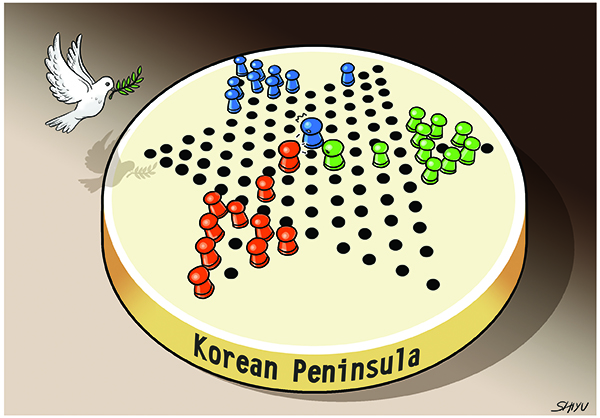Experts react to DPRK decision to end nuclear tests


The Democratic People's Republic of Korea will stop nuclear tests and launches of intercontinental ballistic missiles Saturday, and close its northern nuclear test site, reported the Korean Central News Agency. Three experts shared their views on the DPRK's surprising announcement with China Daily's Pan Yixuan.
National security will remain a priority for Pyongyang
Though progress has been made in the DPRK's talks with the Republic of Korea and the United States, the announcement was still a surprise, made only six days before the summit between DPRK leader Kim Jong-un and Republic of Korea President Moon Jae-in.
National security has been the most important reason for Pyongyang's nuclear development since the late 20th century. It was not possible for Pyongyang to make an unconditional concession to the nuclear issue. Therefore, the sudden decision to halt nuclear tests is very probably due to the recent visit of Mike Pompeo, the US nominee for Secretary of State, with Kim. Conditions were met to comply with Pyongyang's need to protect its national security.
The DPRK said it will pay more attention to economic development, which must be a policy change on the premise of guaranteed security. And the US and the ROK have to give positive a response because the DPRK has taken one step further on their conditions of denuclearization.
But whether the peninsula's process of peace can be maintained relies on effective implementation of the promises the three countries made and will make in the upcoming meetings.
Liu Xuelian, head of the Institute of Northeast Asian Geopolitics and Economics, Jilin University.
The world waits to see positive response of US and ROK
Pyongyang made the first move in January to restart talks with Seoul and extended an olive branch to Washington that has long insisted on strict sanctions against Pyongyang until it agrees to denuclearization.
The strengthening sanctions of the UN had great impact on the DPRK's economy, and a worldwide opposition against Pyongyang's nuclear tests added political pressures that lead Pyongyang to more serious consideration of denuclearization.
Today, Pyongyang showed great sincerity and determination to promote peaceful talks with the ROK and the US for a better environment, where the DPRK can be assured it will realize development.
But Pyongyang agreed to cease nuclear tests instead of giving them up. Whether the peace process on the peninsula will advance, including the denuclearization, requires Washington and Seoul to give positive responses to Pyongyang's concession. Otherwise, Pyongyang will restart the nuclear and missile tests at any time to guarantee its national security with its own power.
Wang Sheng, a researcher at the Co-Innovation Center for Korean Peninsula Studies and professor of International Politics at Jilin University
The peninsula may embrace the best chance to regain peace
In the announcement, Pyongyang also said it would shift focus to economic development, a parallel course with nuclear development decided by Kim, but which has been greatly impacted by United Nations sanctions.
After a long time of sanctions and objection by the international community, the DRRK does need to ease the tension with the external world to improve the sluggish economy.
Besides, its immature nuclear technology decreased Pyongyang's deterrence to protect its national security with stronger military power. Trump tweeted that the US would end talks with Pyongyang if it saw no constructive potential on peninsula denuclearization. And the US so-called anti-chemical weapons bombing in Syria might also have a spillover effect on Pyongyang's determination on the nuclear tests opposed by the world.
And it seemed Kim and Pompeo were very likely to reach agreements on Pyongyang's denuclearization and its need to protect national security. Trump's praise on Twitter for Kim's decision can be regarded as an increasing willingness of the US to talk at the end of May or the beginning of June.
So far, it can be inferred from the announcement of ceasing nuclear tests that, in consideration of economic benefits and military costs, Pyongyang had an historic sincerity to negotiate on denuclearization and to restore peace on the peninsula.
The peninsula has an unprecedented access to peace through a quite positive trend of peaceful talks.
Ba Dianjun, head of the Institute of International Politics at the Northeast Asian Studies College, Jilin University.


































